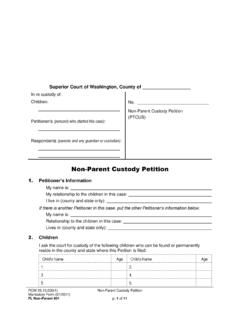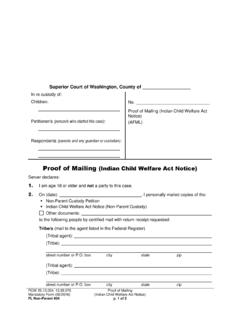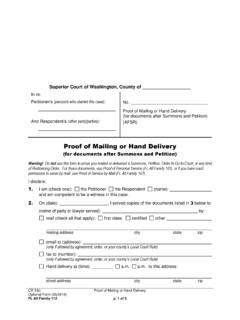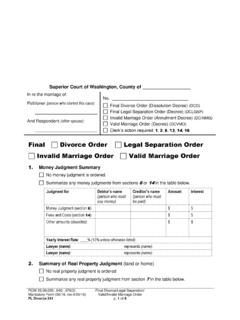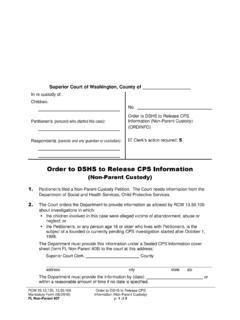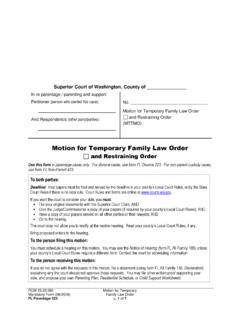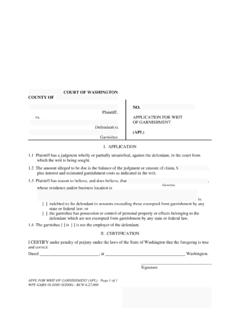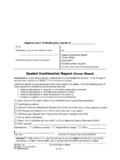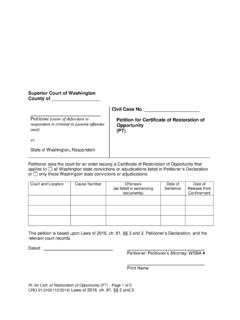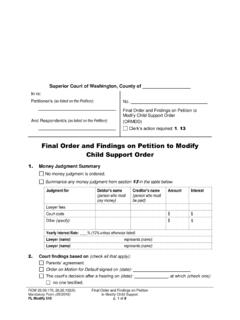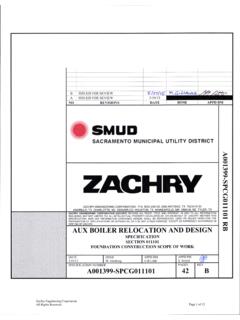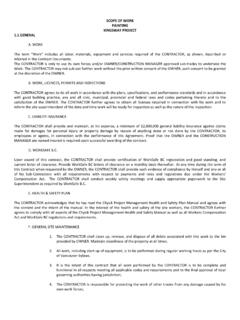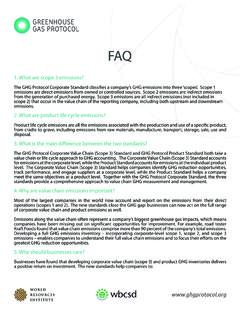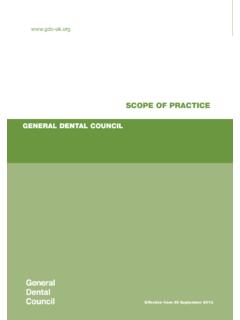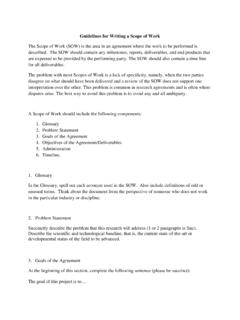Transcription of CR 26 GENERAL PROVISIONS GOVERNING DISCOVERY (a) …
1 CR 26 GENERAL PROVISIONS GOVERNING DISCOVERY (a) DISCOVERY Methods. Parties may obtain DISCOVERY by one or more of the following methods: depositions upon oral examination or written questions; written interrogatories; production of documents or things or permission to enter upon land or other property, for inspection and other purposes; physical and mental examinations; and requests for admission. (b) DISCOVERY Scope and Limits. Unless otherwise limited by order of the court in accordance with these rules, the scope of DISCOVERY is as follows: (1) In GENERAL . Parties may obtain DISCOVERY regarding any matter, not privileged, which is relevant to the subject matter involved in the pending action, whether it relates to the claim or defense of the party seeking DISCOVERY or to the claim or defense of any other party, including the existence, description, nature, custody, condition and location of any books, documents, or other tangible things and the identity and location of persons having knowledge of any discoverable matter.
2 It is not ground for objection that the information sought will be inadmissible at the trial if the information sought appears reasonably calculated to lead to the DISCOVERY of admissible evidence. The frequency or extent of use of the DISCOVERY methods set forth in section (a) shall be limited by the court if it determines that: (A) the DISCOVERY sought is unreasonably cumulative or duplicative, or is obtainable from some other source that is more convenient, less burdensome, or less expensive; (B) the party seeking DISCOVERY has had ample opportunity by DISCOVERY in the action to obtain the information sought.
3 Or (C) the DISCOVERY is unduly burdensome or expensive, taking into account the needs of the case, the amount in controversy, limitations on the parties, resources, and the importance of the issues at stake in the litigation. The court may act upon its own initiative after reasonable notice or pursuant to a motion under section (c). (2) Insurance Agreements. A party may obtain DISCOVERY and production of: (i) the existence and contents of any insurance agreement under which any person carrying on an insurance business may be liable to satisfy part or all of a judgment which may be entered in the action or to indemnify or reimburse for payments made to satisfy the judgment; and (ii) any documents affecting coverage (such as denying coverage, extending coverage, or reserving rights) from or on behalf of such person to the covered person or the covered person's representative.
4 Information concerning the insurance agreement is not by reason of disclosure admissible in evidence at trial. For purposes of this section, an application for insurance shall not be treated as part of an insurance agreement. (3) Structured Settlements and Awards. In a case where a settlement or final award provides for all or part of the recovery to be paid in the future, a party entitled to such payments may obtain disclosure of the actual cost to the defendant of making such payments. This disclosure may be obtained during settlement negotiations upon written demand by a party entitled to such payments.
5 If disclosure of cost is demanded, the defendant may withdraw the offer of a structured settlement at any time before the offer is accepted. (4) Trial Preparation: Materials. Subject to the PROVISIONS of subsection (b)(5) of this rule, a party may obtain DISCOVERY of documents and tangible things otherwise discoverable under subsection (b)(1) of this rule and prepared in anticipation of litigation or for trial by or for another party or by or for that other party's representative (including a party s attorney, consultant, surety, indemnitor, insurer, or agent) only upon a showing that the party seeking DISCOVERY has substantial need of the materials in the preparation of such party s case and that the party is unable without undue hardship to obtain the substantial equivalent of the materials by other means.
6 In ordering DISCOVERY of such materials when the required showing has been made, the court shall protect against disclosure of the mental impressions, conclusions, opinions, or legal theories of an attorney or other representative of a party concerning the litigation. A party may obtain without the required showing a statement concerning the action or its subject matter previously made by that party. Upon request, a person not a party may obtain without the required showing a statement concerning the action or its subject matter previously made by that person. If the request is refused, the person may move for a court order.
7 The PROVISIONS of rule 37(a)(4) apply to the award of expenses incurred in relation to the motion. For purposes of this section, a statement previously made is, (A) a written statement signed or otherwise adopted or approved by the person making it, or (B) a stenographic, mechanical, electrical, or other recording, or a transcription thereof, which is substantially verbatim recital of an oral statement by the person making it and contemporaneously recorded. (5) Trial Preparation: Experts. DISCOVERY of facts known and opinions held by experts, otherwise discoverable under the PROVISIONS of subsection (b)(1) of this rule and acquired or developed in anticipation of litigation or for trial, may be obtained only as follows.
8 (A) (i) A party may through interrogatories require any other party to identify each person whom the other party expects to call as an expert witness at trial, to state the subject matter on which the expert is expected to testify, to state the substance of the facts and opinions to which the expert is expected to testify and a summary of the grounds for each opinion, and to state such other information about the expert as may be discoverable under these rules. (ii) A party may, subject to the PROVISIONS of this rule and of rules 30 and 31, depose each person whom any other party expects to call as an expert witness at trial.
9 (B) A party may discover facts known or opinions held by an expert who is not expected to be called as a witness at trial, only as provided in rule 35(b) or upon a showing of exceptional circumstances under which it is impracticable for the party seeking DISCOVERY to obtain facts or opinions on the same subject by other means. (C) Unless manifest injustice would result, (i) the court shall require that the party seeking DISCOVERY pay the expert a reasonable fee for time spent in responding to DISCOVERY under subsections (b)(5)(A)(ii) and (b)(5)(B) of this rule; and (ii) with respect to DISCOVERY obtained under subsection (b)(5)(A)(ii) of this rule the court may require, and with respect to DISCOVERY obtained under subsection (b)(5)(B) of this rule the court shall require the party seeking DISCOVERY to pay the other party a fair portion of the fees and expenses reasonably incurred by the latter party in obtaining facts and opinions from the expert.
10 (6) Claims of Privilege or Protection as Trial-Preparation Materials for Information Produced. If information produced in DISCOVERY is subject to a claim of privilege or of protection as trial-preparation material, the party making the claim may notify any party that received the information of the claim and the basis for it. After being notified, a party must promptly return, sequester, or destroy the specified information and any copies it has; must not use or disclose the information until the claim is resolved; and must take reasonable steps to retrieve the information if the party disclosed it before being notified.
